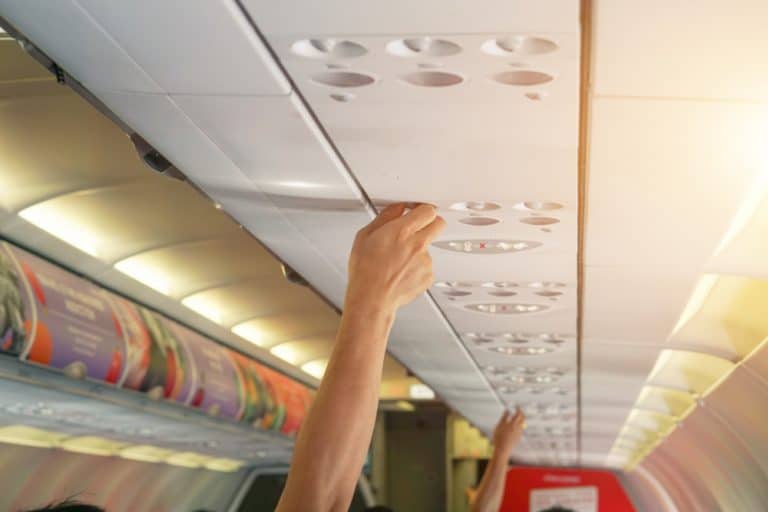In 2019, being an aircrew member was ranked the 3rd most stressful occupation. Hectic schedules, long flights under higher altitudes, and cabin air contamination increase occupational, both mental and physical stress. Inhaling contaminated cabin air can also increase the risk of developing “Aerotoxic Syndrome.”
It is important first to describe the causes of occupational health issues. This way, we can then discuss how to prevent these issues from appearing in the first place.
In this article, we discuss: working on airplanes, long term health consequences, and how to stay healthy as an aircrew member.
The Causes of Health Problems for Aircrew Members

High-Altitude Flights
Altitude sickness (in its mildest form: Acute Mountain Sickness) can happen from rapid elevation without balancing air pressure and lowered oxygen level. Even though altitude sickness is often associated with mountain climbers, it is also experienced on airplanes.
Significant health issues can result from being 8,200 feet above sea level (1) and changes in oxygen and humidity levels. Since airplanes can fly up to 30,000 to 45,000 feet and have changing oxygen and humidity levels, aircrew members can experience stress, headaches, dry skin, and dry throat.
One way to prevent aircrew members from experiencing altitude sickness is adequate water consumption prior, during, and post-flight.

Cabin Air Contamination
Due to dirty filters, cabin air can often carry harmful chemicals, such as leaked engine oil. Breathing in this contaminated air can cause several health issues for aircrew members.
Bleed air is the compressed air from the upstream of the plane’s turbines. Breathing in bleed air has been recognized as contamination, since the 1950s, when bleed air was introduced in aerospace engineering (2). The compressed and warm air (used to make passengers comfortable at high altitudes) often comes from the plane’s jet engine and mixes with recirculated cabin air. This bleed air system results in toxin exposure. In the long term, these toxins can accumulate in the body and cause both short-term problems such as dizziness, headaches, forgetfulness, getting confused, and long-term issues such as chronic fatigue and aerotoxic syndrome.
Aerotoxic syndrome is considered one of the most dangerous health conditions that aircrew and pilots experience after flying long-term. Frequent travelers are also at the same risk as they are regularly exposed to toxic cabin air during flights.
Aerospace Toxicology:
There are contradictory views regarding aerotoxic syndrome as an occupational hazard. According to the “Aerospace Toxicology” report, the levels of contaminants used in reports are often below exposure standards. They do not apply to the public, altitude level, or a complex pyrolyzed mixture (3). The respiratory symptoms are likely to directly due to irritation or damage to the lung tissue. Additionally, nontoxic substances may become highly toxic within a pyrolyzed mixture (4).

Long-Haul Flights and Changing Flight Schedules
Flying either standing or sitting for long periods of time can cause deep vein thrombosis. This occurs because blood flows at a slower rate down our legs. Deep vein thrombosis can especially happen with pilots, as they cannot leave their seats during flights. Additionally, constipation is a health issue experienced, resulting from sitting for long periods of time, and dehydration.
Changing flight schedules and traveling to a different time zone can disturb aircrew members’ circadian rhythm, sleep quality, and sleep-wake patterns.
One of the most common problems due to disturbed circadian rhythm is chronic fatigue. Symptoms include sleep deprivation, wakefulness, concentration problems, which can affect both mental and physical performance capacity. Travel across time zones and work during a flight attendant’s normal sleep hours were both linked to chronic circadian disruption in a group of flight attendants.
Aircrew members travel across time zones and also work during normal sleep hours, and therefore, are exposed to chronic jet lag. This can cause daytime fatigue, difficulty staying focused, and digestive problems. Chronic jet lag is dangerous and can cause long-term health problems.
3 Key Steps in Staying Healthy as Aircrew
These three steps can be followed for a healthier lifestyle as aircrew: Detoxification, following a balanced diet, and natural supportive therapies.

1. Detoxification
Regular detoxification helps to eliminate persistent organic pollutants and toxin build-up in the body. One main reason for immune deficiency, experienced aircrew, is due to toxin build-up. These toxins can be from polluted cabin air, irregular lifestyle, and poor diet. Therefore, aircrew members are encouraged to undergo regular detoxification to boost their immune system and trigger the body’s natural healing process.
Toxin accumulation can also affect mood and cause stress. By removing toxins, aircrew members may experience improved sleep, thought clarity, and have higher energy levels.

2. Following a Balanced Diet
Following a balanced plant-based diet is an essential aspect for aircrew members. By providing necessary nutrients to your body, through nutrient-dense foods, this support to your digestive system works to help to reduce inflammation. Besides, a plant-based diet can also help to reduce inflammation and prevent constipation and digestive issues.
Additionally, plant-based diets have been shown to improve your cholesterol levels and to control your blood pressure (5). This improved blood pressure can help to prevent deep vein thrombosis effectively.
3. Supportive Therapies
TheLifeCo Well Being Center is proud to present an exclusively designed health and wellness retreat, specialized for aircrew members. “The LifeCo Aircrew Wellness Program” is intended for aircrew members who want to improve their physical and mental health, detoxify, and boost their immune systems.
Intravenous (IV) protocols such as “Immune Support Protocol” and “Vitamin C” IV protocols can help to accelerate the healing process, boost the immune system, improve energy, and reduce stress.
A disturbed circadian rhythm due to change flight schedules and traveling to a different time zone can be fixed through an anti-fatigue IV protocol. The anti-fatigue protocol is ideal for improving sleep quality, preventing chronic jet lag, and chronic fatigue.
Ozone therapy is advised to prevent Altitude Sickness. Ozone therapy works by increasing blood levels of oxygen, creating an aerobic environment in which anaerobic cells (such as bacteria and fungi) cannot metabolize and thrive.
Lymphatic therapies, such as Electro-lymphatic therapy and BEMER, work by supporting the body’s natural ability to heal itself. Therefore, it is advised to use these therapies to prevent deep vein thrombosis by increasing micro and macro blood circulation.
These natural therapies can be used to support your detox process and provide long-lasting benefits to your body.
To learn more about to stay healthy as an aircrew if please check our The LifeCo Aircrew Wellness Program page.
References
1.The patient with coronary heart disease at altitude: observations during acute exposure to 3100 meters. Morgan BJ, Alexander JK, Nicoli SA, et al. J Wilderness Med. 1990; 1:147.
2.Reddall H. Elimination of engine bleed air contamination. SAE Technical Paper 550185. Warrendale: SAE International; 1955.
3.Chaturvedi A. Aerospace toxicology: an overview. DOT/ FAA/AM-09/8. Oklahoma City: Civil Aerospace Medical Institute, Federal Aviation Administration; 2009.
4.ACGIH TLVs and BEIs: threshold limit values for chemical substances and physical agents. Cincinnati: American Conference of Governmental Industrial Hygienists; 2015.







